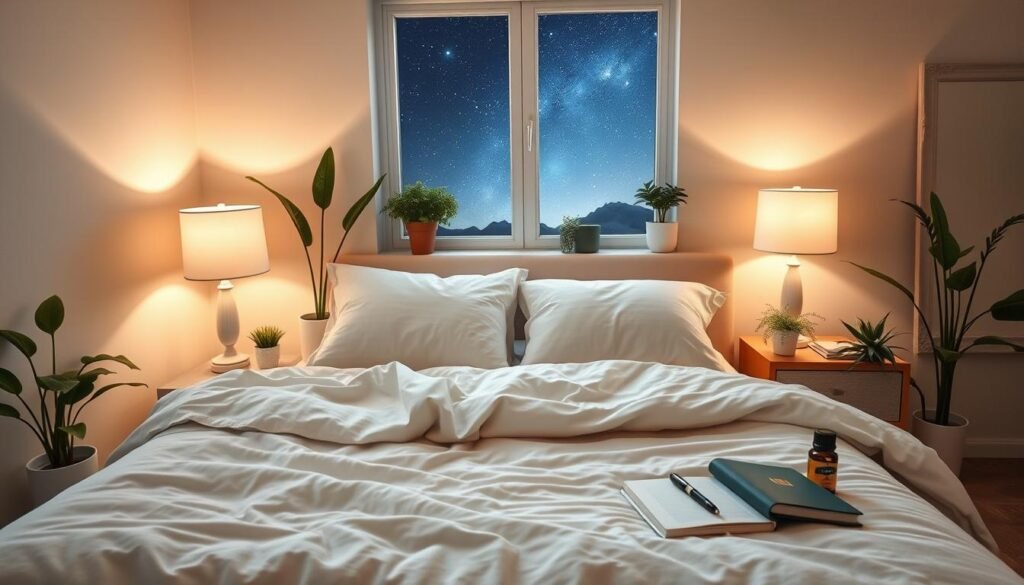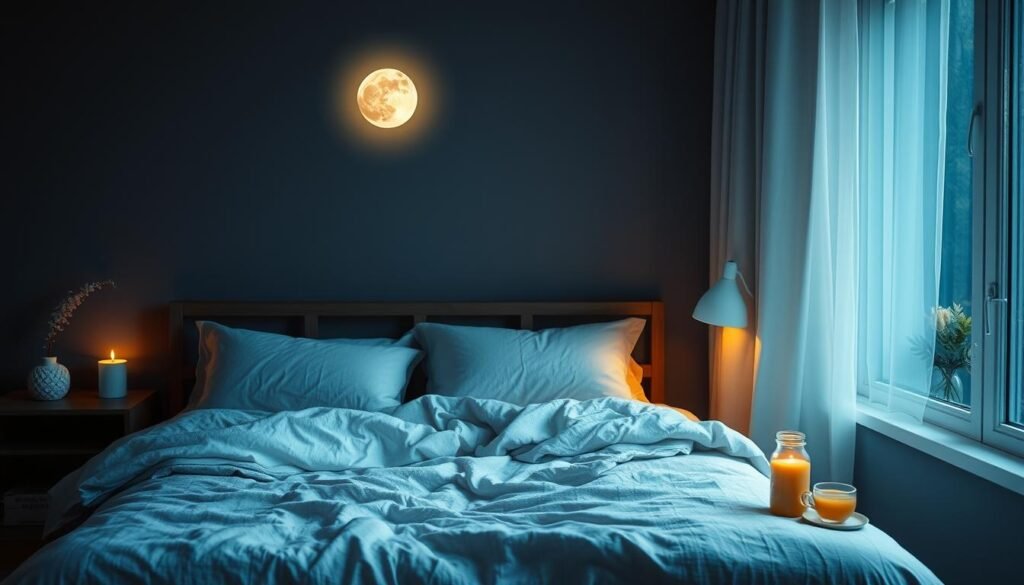About 40 million adults in the US suffer from anxiety disorders. This makes it the country’s most common mental illness. Many struggle to find peaceful sleep due to this. Nighttime becomes a time of worry and restlessness for those with anxiety. They fight against their thoughts, making it tough to relax. This can create a cycle where anxiety leads to sleep loss, increasing anxiety even more.
Learning how to sleep when anxious is key to better health. Having a regular bedtime routine helps. So does making your environment peaceful. This article offers expert advice for dealing with anxiety at night. These tips aim to help you enjoy restful sleep again.
Key Takeaways
- Anxiety can disrupt sleep, creating a vicious cycle that worsens mental health.
- Approximately 40 million adults in the U.S. are affected by anxiety disorders.
- Regular bedtime routines can significantly improve sleep quality.
- Products like weighted blankets and sound machines may promote relaxation.
- Effective strategies for better sleep include breathing techniques and progressive muscle relaxation.
- Creating a calm sleep environment is essential for overcoming sleep anxiety.
The Connection Between Anxiety and Sleep
The anxiety and sleep connection is quite complex and impacts many people. About 30% of adults deal with anxiety disorders at some point. This includes Generalized Anxiety Disorder (GAD) which causes intense worry about daily stressors. These worries can make it hard to relax at night.
Anxiety causes the body to be more alert and makes relaxing tough, disrupting sleep. Those with Panic Disorder may feel increased fear and discomfort. This makes getting restful sleep even harder. Research shows that nearly 90% of people with anxiety have trouble sleeping.
Not sleeping enough can make anxiety worse and even lead to other mental health issues like insomnia or depression. This creates a tough cycle. Lack of sleep makes anxiety worse, harming mental and physical health.
Treatments like Cognitive Behavioral Therapy (CBT) have been effective in managing these symptoms. These therapies help change negative thoughts related to anxiety, improving sleep. For more strategies, check out resources like Sleep Foundation.
| Anxiety Disorder | Symptoms | Impact on Sleep |
|---|---|---|
| Generalized Anxiety Disorder (GAD) | Overwhelming worry, restlessness | Difficulty falling asleep, insomnia |
| Panic Disorder | Repeated panic attacks, rapid heartbeat | Nightmares, fear of sleep |
| Social Anxiety Disorder | Fear of judgment, embarrassment | Racing thoughts, trouble relaxing |
| Phobia-Related Disorders | Irrational fears, avoidance behaviors | Increased anxiety at night |
It’s important to address the anxiety and sleep connection for better mental health. By understanding this link, people can work towards better sleep and managing anxiety.
Understanding Sleep Hygiene for Anxiety
People with anxiety often struggle to sleep well. Sleep hygiene for anxiety is crucial for feeling better overall. Good sleep habits are essential as they help improve sleep quality. These habits can reduce anxiety symptoms and make sleep more peaceful.
Having a regular sleep schedule helps set your body’s clock. A bedtime routine that promotes relaxation can help people with anxiety. Blue light from screens can interfere with sleep by affecting melatonin. So, cutting down on screen time at night is important for better sleep.
A calm place to sleep is key for good rest. Things like comfy bedding, a cool room, and little noise make a big difference. avoiding big meals, caffeine, and alcohol before bed helps too. Taking a warm bath or doing mindfulness activities before bed can also improve sleep quality.
Focusing on calming techniques such as deep breathing or muscle relaxation is helpful. These methods ease anxiety and help with falling asleep. It’s important to find a sleep routine that works best for you. Each person’s needs and situations are different in finding the best sleep practices.

| Sleep Hygiene Tips | Benefits |
|---|---|
| Establish a consistent sleep schedule | Regulates the body’s internal clock |
| Limit screen time before bed | Enhances melatonin production |
| Create a calm sleeping environment | Reduces disruptions and enhances comfort |
| Avoid caffeine and heavy meals in the evening | Supports smoother transitions to sleep |
| Practice relaxation techniques | Reduces anxiety and promotes restful sleep |
Applying these key tips can lead to better sleep hygiene for those with anxiety. While it may take time to form new habits, the outcome is improved sleep and emotional well-being.
How to Go to Sleep with Anxiety
Sleep anxiety is tough for many. To handle it, start by knowing the signs and symptoms. You might have racing thoughts or worry a lot about how well you’ll sleep. Maybe you’re scared of having nightmares. It’s key to spot these sleep anxiety symptoms early. This helps in managing stress and sleeping better.
Recognizing Symptoms of Sleep Anxiety
Anxiety at night often shows up as troubling thoughts. These can lead to distress as you try to sleep. You might start worrying too much about how well you sleep, which makes things worse. Recognizing these signs is the first step to improve your mental health. It helps you find the right ways to calm your mind.
The Vicious Cycle of Anxiety and Sleep Deprivation
Anxiety and sleep problems go hand in hand, creating a difficult sleep deprivation cycle. When you’re anxious, your sleep suffers. This makes you tired and more anxious. About 40 million adults struggle with this. Without help, such as relaxation skills or therapy, the problem can keep getting worse. To learn more about beating sleep anxiety, check out this useful resource.

Relaxation Techniques for Sleep
Effective relaxation methods can greatly reduce anxiety and enhance sleep. Adding these practices to your nightly routine creates a calm setting. This helps you handle daily stress better. It sets the groundwork for better sleep habits.
Breathing Exercises for Sleep
Breathing techniques, like diaphragmatic breathing and the 4-7-8 exercise, calm the nervous system. They slow down your heartbeat, bringing tranquility. With one-third of adults struggling with sleep, these exercises improve relaxation at night.
Progressive Muscle Relaxation
Progressive muscle relaxation is an effective way to find peace. You tense and relax different muscle groups. This releases tension, making you feel calmer. Studies show this method boosts sleep quality and mental health.
Meditation and Mindfulness Practices
Meditation and mindfulness have become popular for reducing sleep anxiety. Practices like yoga nidra and visualization focus on calming images. They help shift away from anxious thoughts. Adding these to your bedtime routine can deepen relaxation and help with sleep.

| Technique | Benefits | Application |
|---|---|---|
| Diaphragmatic Breathing | Reduces stress, slows heartbeat | Practice before bedtime |
| Progressive Muscle Relaxation | Releases physical tension | Targets muscle groups in sequence |
| Mindfulness Meditation | Improves emotional regulation | Focus on breathing and present moment |
| Visualization | Creates a sense of well-being | Imagine calming scenes or scenarios |
Using these techniques not only helps with immediate sleep issues but also improves long-term sleep. If sleep problems persist, seeking help from a doctor is crucial. Coping strategies can also aid in better sleep and overall health.
Establishing a Bedtime Routine for Anxiety
Setting up a bedtime routine helps control anxiety and improves sleep. This routine tells your body it’s time to relax. It makes a peaceful sleeping space, which is key for those with anxiety.
Creating a Calm Environment
Making your bedroom calm is crucial for a good bedtime routine. Here are things to make your sleep area peaceful:
- Declutter the bedroom: A clean room helps you relax and cuts down on distractions.
- Utilize relaxation aids: Using white noise machines or calming music can block out annoying noises. This helps you sleep better.
- Adjust lighting: Soft, low lights tell your body bedtime is near.
- Control temperature: A cooler room often leads to better sleep.
Setting Consistent Sleep Schedules
Keeping a regular sleep schedule is vital for less anxiety and better sleep. Here are steps to keep a normal sleep pattern:
- Fixed bedtime: Sleeping at the same time every night gets your body ready for sleep.
- Wake-up time consistency: Getting up at the same time every day helps your body’s clock stay on track.
- Avoiding caffeine and alcohol: It’s important to not have these 4 hours before bed. They can mess with your sleep.
- Limiting naps: Daytime naps can make it hard to sleep at night, affecting how rested you feel.
Sticking to a bedtime routine and a calm sleep space can reduce anxiety and improve sleep. Regular sleep times bring stability. This makes it easier to relax at night.
Natural Remedies for Sleep Anxiety
Seeking natural remedies for sleep anxiety can offer effective ways to relax and sleep better. Adding herbal supplements and aromatherapy to your nighttime routine can help calm night-time worries.
Herbal Supplements to Consider
Many herbal supplements can aid in achieving more restful sleep. Here are some top choices:
| Herbal Supplement | Benefits | Notes |
|---|---|---|
| Chamomile | Calming effects that may help relax the mind and body. | Commonly consumed as tea. |
| Valerian Root | May significantly improve sleep quality and reduce latency. | Well-tolerated for short-term use. |
| Melatonin | Effective in decreasing time to sleep onset and enhancing sleepiness. | Fast-release forms may work better than slow-release. |
| Passionflower Extract | Promotes improvements in total sleep time and efficiency. | Notable results observed over two weeks. |
| Magnesium | May help reduce the time needed to fall asleep in older adults. | Deficiency associated with poor sleep quality. |
Using Aromatherapy for Relaxation
Aromatherapy is popular for those aiming for better sleep. Using essential oils, the bedroom becomes more welcoming. Here are some favorites:
- Lavender: Its calming properties can enhance sleep and cut down anxiety.
- Bergamot: This citrus scent can lessen stress for quieter sleep.
- Chamomile: Apart from its herbal supplement use, chamomile oil also helps make a peaceful bedroom setting.
Managing Anxiety for Better Sleep
Dealing with anxiety is key for good sleep. Using certain techniques can reduce night worries. This makes a restful night more likely.
Cognitive Strategies for Sleep Anxiety
Cognitive strategies are key in handling anxiety for sleep. You can set aside time during the day to worry. This stops worries from keeping you up at night. Cognitive Behavior Therapy (CBT) techniques, like cognitive shuffling, redirect thoughts to help relax. Adding calming practices to your daily life can also improve sleep.
Constructive Worry Techniques
Constructive worry helps with sleep-affecting anxiety. It involves separating worries you can handle from those needing more thought. Writing these down helps gain control. Trying relaxation practices like deep breathing makes sleep easier.
Doing calming activities before bed helps too. Listening to soothing music or using lavender oil can lower anxiety. This makes your sleep area more peaceful, directly tackling how anxiety affects sleep.
Tips for Getting Outside to Improve Sleep
Going outdoors offers many benefits for both the mind and body, boosting sleep quality. Studies have found that just 120 minutes a week in nature can better health and wellness. This also helps in improving sleep with nature. Walking or jogging outside helps keep our body’s clock in sync, essential for good sleep.
Taking a calm walk in the woods can help fight off depression and anxiety. It’s even more effective than exercising inside. A 90-minute nature walk can reduce negative thoughts by decreasing certain brain activities. This clarity is key for restful sleep. Also, being outside improves memory and thinking skills, helping the mind unwind at night.
Making outdoor activities for better sleep a part of your daily life can aid those with anxiety or trouble sleeping. Natural light during the day boosts melatonin in the evening. It also creates a feeling of connection to the world, important for our mental health. So, aim to spend time outside every week to uplift your mood and sleep better.